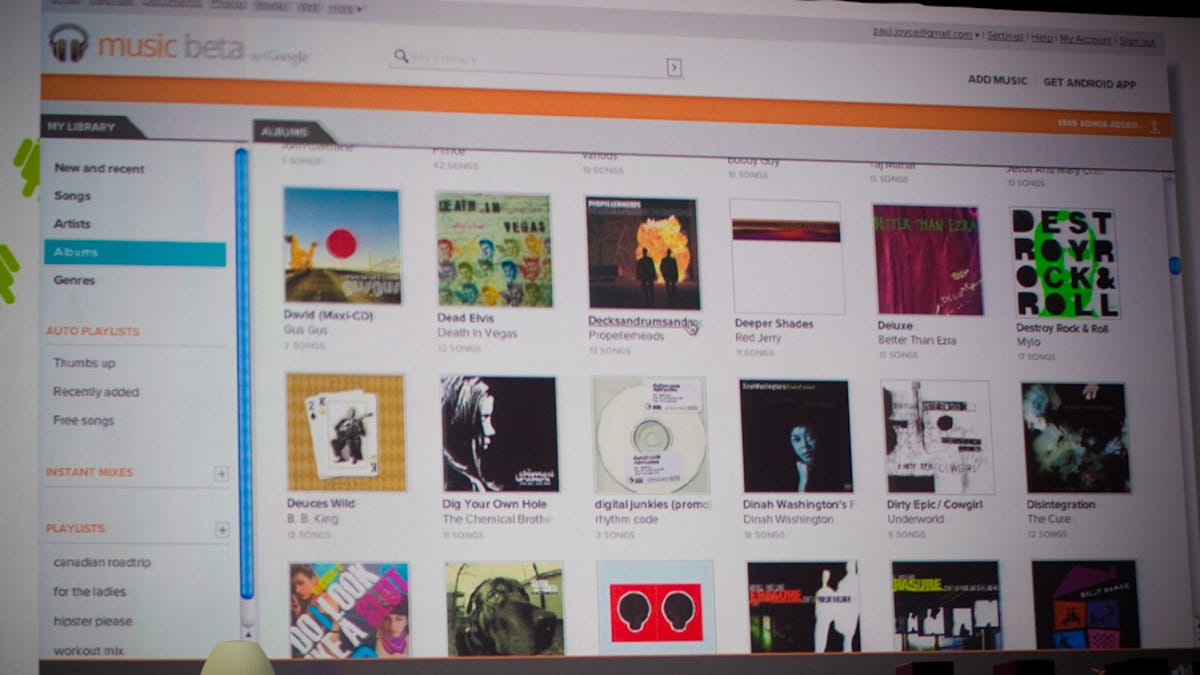Google: Our music service is legal
The company defends its cloud-based music service and says that it was designed to ensure that it does not violate copyrights.

SAN FRANCISCO--Google defended its music storage service at a press conference today shortly after it unveiled the service at its developer conference here.
The new Google Music service, which CNET first reported last night, allows people to store up to 20,000 songs in the Internet "cloud." The benefit of doing this is that they will then be able to access the music from any Web browser that supports Flash or Android devices. The service is still being beta-tested and will only be offered to a select group of invitation-only users in the U.S. Initially, the service will be free to users, but Paul Joyce, a Google project manager demonstrating the service during the keynote this morning at Google I/O, hinted that Google may charge for the service in the future.
He also hinted at capabilities being added to the service in the future. But for now Google only will allow music to be stored remotely. It won't allow users to purchase new music via the cloud.
Jamie Rosenberg , direct of digital content for Android, answered a question from a reporter about whether Google was afraid that music studios would take issue with Google allowing its users to move music digitally across the Internet. He responded by saying that the service is "completely legal," because it allows people to store only music that they own legally. Rosenberg admitted that Google had wanted to offer music labels an opportunity to sell music to Google users through the cloud service, but that the labels had asked for certain conditions that Google couldn't accept.
He wouldn't discuss details of the negotiations, but he emphasized Google's commitment to protecting the rights of music producers.
"We very much respect copyright," he said. "And we designed this service so that you can use your own personal music collection out of respect for those who create the music."
When asked how Google would police content stored on the music service to make sure it's legal, Google's Andy Rubin stepped in to answer the question. He said that Google will respond to rights holders who believe that unauthorized music is being stored on Google's service.
During the morning's keynote address, Google also demonstrated how some of its other technology initiatives will fit with the Google cloud-based music service. The Android @Home initiative will let Android-based devices control appliances and other devices in the home. Part of this initiative demonstrated during the keynote was "Project Tungsten," which offered a mechanism for streaming music to speakers and stereos throughout the home wireless. Using an Android tablet a user could access music in the Google Music cloud and play the songs throughout the home on any set of speakers or devices via the Android @Home technology and Project Tungsten capability. In essence the service replaces other wirelessly networked music playing services, such as Sonos wireless music system.
Another part of the demonstration showed a future capability that could be built into the system using near-field communication (NFC) technology. The demonstrator took a CD filled with music and touched it to the Tungsten speaker system. The music from the CD was automatically uploaded to the Google cloud service and the Tungsten speakers then began playing the music streamed from the cloud service.
Google also took the wraps off a movie download service that allows people to rent movies and view them on any Android device. Google is charging $1.99 for the movie rentals. And it allows users to watch the movies on any Android device they want. If they need to stop watching a movie, viewers can pick up where they left off on another Android device. A movie can be viewed for 24 hours once the movie has been started.

